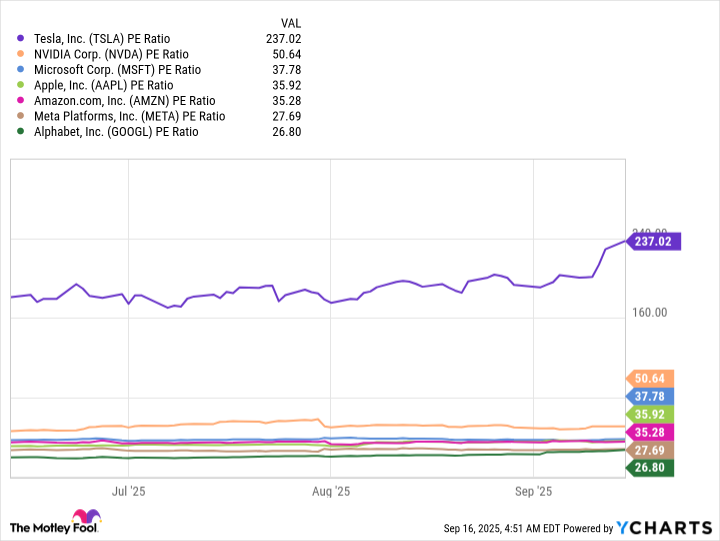The U.S. economy has a habit of producing the world's most valuable companies:
- U.S Steel (now owned by Nippon Steel) became the world's first $1 billion enterprise in 1901.
- General Motors rode the automotive boom to beat every other company to the $10 billion milestone in 1955.
- General Electric built a conglomerate that became the world's first $100 billion business in 1995.
- Apple crossed the most significant milestone of all in 2018, when successful products like the iPhone catapulted the company to a $1 trillion valuation.
There are now nine American companies with valuations of at least $1 trillion, and four of them have graduated into the ultra-exclusive $3 trillion club: Apple, Microsoft, Nvidia, and Alphabet (GOOG 1.27%) (GOOGL 1.23%).
Alphabet is the newest member, having officially joined on Monday, Sept. 15. It's the parent company of Google, YouTube, Waymo, and more, all of which are being supercharged by artificial intelligence (AI).
Its stock is in the neighborhood of a record high right now, but its attractive valuation suggests more upside could be on the way. Read on.

Alphabet headquarters, in Mountain View, California. Image source: Alphabet.
Google Search turned AI from a threat into a tailwind
Wall Street expects Alphabet to generate a record $394 billion in total revenue during 2025, according to Yahoo! Finance. Google Search is likely to account for more than half of that figure on its own, so it's the company's most important segment by far.
When AI chatbots like ChatGPT went mainstream two years ago, investors feared they would drive internet traffic away from Google Search because they offered a faster, more convenient way to find information online. However, Alphabet mounted an aggressive response to protect its golden goose.
The company developed a family of large language models (LLMs) called Gemini -- and its own chatbot, which bears the same name -- to compete with start-ups like OpenAI. And those LLMs also power a new Google Search feature called AI Overviews, which combine text, images, and links to third-party sources to create more comprehensive answers to search queries.
Overviews appear above the traditional Google results, so users no longer have to spend time sifting through web pages to find the information they need. Over 2 billion people are using them every month, and Alphabet says they generate advertising revenue at roughly the same rate as regular Google Search outputs, so they aren't hurting the company's core business.
Google Search's revenue growth actually accelerated from 9.8% in the first quarter of 2025 to 11.7% during the second quarter, suggesting the business is building momentum, not slowing down. This offers some proof that AI Overviews are having the desired effect.
Google Cloud is Alphabet's growth engine
Google Search might be Alphabet's biggest business, but Google Cloud is the fastest growing. It generated a record $13.6 billion in revenue during the second quarter, which was up 32% year over year. That growth rate accelerated from 28% in the first quarter.
Google Cloud operates state-of-the-art data centers filled with chips from leading suppliers such as Nvidia, and it rents the computing capacity to developers, which use it to build AI software. The platform also offers access to hundreds of ready-made LLMs, including Gemini, which developers can use to accelerate their progress. Over 85,000 organizations are now using Gemini to create AI software.
This business still has plenty of room to grow because it had a $106 billion order backlog at the end of the second quarter, from customers waiting for more data center capacity to come online. That was up 38% year over year, so based on Google Cloud's revenue growth during the quarter, demand appears to be increasing even faster than supply.
The stock still looks cheap
The U.S. Department of Justice won a lawsuit against Alphabet last year, which determined that the company used monopolistic practices to safeguard its market share in the internet search industry. For example, Alphabet paid Apple enormous annual fees to make Google the default search engine on devices like the iPhone, making it almost impossible for other search engines to compete.
Lawmakers sought to break up Alphabet by forcing it to sell certain assets, which could have significantly disrupted the company's ability to generate revenue. Its valuation has been suppressed for the last couple of years while this saga played out, as investors braced for the worst.
But earlier this month, the judge in the case handed down a rather lenient decision that will allow management to continue paying partners like Apple, as long as the deals aren't exclusive. He also declined to support the Justice Department's proposed breakup.
Alphabet stock has surged by almost 20% since the ruling, which catapulted the company into the $3 trillion club. But with a price-to-earnings ratio (P/E) of just 26.8, it's still the cheapest stock in the "Magnificent Seven" (a group of peers operating at the forefront of the AI industry), as shown in the chart below.
For that reason, I think Alphabet stock still has plenty of room to run.






